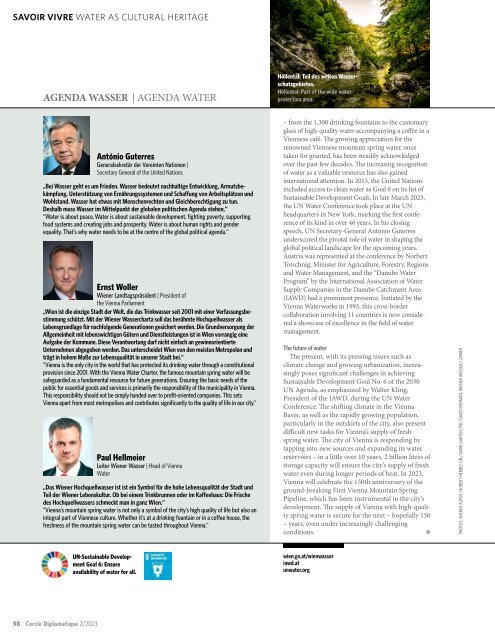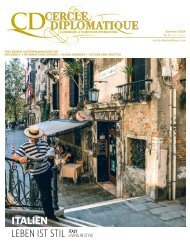CERCLE DIPLOMATIQUE - issue 02/2023
CD is an independent and impartial magazine and is the medium of communication between foreign representatives of international and UN-organisations based in Vienna and the Austrian political classes, business, culture and tourism. CD features up-to-date information about and for the diplomatic corps, international organisations, society, politics, business, tourism, fashion and culture. Furthermore CD introduces the new ambassadors in Austria and informs about designations, awards and top-events. Interviews with leading personalities, country reports from all over the world and the presentation of Austria as a host country complement the wide range oft he magazine.
CD is an independent and impartial magazine and is the medium of communication between foreign representatives of international and UN-organisations based in Vienna and the Austrian political classes, business, culture and tourism. CD features up-to-date information about and for the diplomatic corps, international organisations, society, politics, business, tourism, fashion and culture. Furthermore CD introduces the new ambassadors in Austria and informs about designations, awards and top-events. Interviews with leading personalities, country reports from all over the world and the presentation of Austria as a host country complement the wide range oft he magazine.
You also want an ePaper? Increase the reach of your titles
YUMPU automatically turns print PDFs into web optimized ePapers that Google loves.
SAVOIR VIVRE WATER AS CULTURAL HERITAGE<br />
AGENDA WASSER | AGENDA WATER<br />
Höllental: Teil des weiten Wasserschutzgebietes.<br />
Höllental: Part of the wide water<br />
protection area.<br />
António Guterres<br />
Generalsekretär der Vereinten Nationen |<br />
Secretary General of the United Nations<br />
„Bei Wasser geht es um Frieden. Wasser bedeutet nachhaltige Entwicklung, Armutsbekämpfung,<br />
Unterstützung von Ernährungssystemen und Schaffung von Arbeitsplätzen und<br />
Wohlstand. Wasser hat etwas mit Menschenrechten und Gleichberechtigung zu tun.<br />
Deshalb muss Wasser im Mittelpunkt der globalen politischen Agenda stehen.“<br />
“Water is about peace. Water is about sustainable development, fighting poverty, supporting<br />
food systems and creating jobs and prosperity. Water is about human rights and gender<br />
equality. That’s why water needs to be at the centre of the global political agenda.“<br />
Ernst Woller<br />
Wiener Landtagspräsident | President of<br />
the Vienna Parliament<br />
„Wien ist die einzige Stadt der Welt, die das Trinkwasser seit 2001 mit einer Verfassungsbestimmung<br />
schützt. Mit der Wiener Wassercharta soll das berühmte Hochquellwasser als<br />
Lebensgrundlage für nachfolgende Generationen gesichert werden. Die Grundversorgung der<br />
Allgemeinheit mit lebenswichtigen Gütern und Dienstleistungen ist in Wien vorrangig eine<br />
Aufgabe der Kommune. Diese Verantwortung darf nicht einfach an gewinnorientierte<br />
Unternehmen abgegeben werden. Das unterscheidet Wien von den meisten Metropolen und<br />
trägt in hohem Maße zur Lebensqualität in unserer Stadt bei.“<br />
“Vienna is the only city in the world that has protected its drinking water through a constitutional<br />
provision since 2001. With the Vienna Water Charter, the famous mountain spring water will be<br />
safeguarded as a fundamental resource for future generations. Ensuring the basic needs of the<br />
public for essential goods and services is primarily the responsibility of the municipality in Vienna.<br />
This responsibility should not be simply handed over to profit-oriented companies. This sets<br />
Vienna apart from most metropolises and contributes significantly to the quality of life in our city.”<br />
Paul Hellmeier<br />
Leiter Wiener Wasser | Head of Vienna<br />
Water<br />
„Das Wiener Hochquellwasser ist ist ein Symbol für die hohe Lebensqualität der Stadt und<br />
Teil der Wiener Lebenskultur. Ob bei einem Trinkbrunnen oder im Kaffeehaus: Die Frische<br />
des Hochquellwassers schmeckt man in ganz Wien.“<br />
“Vienna’s mountain spring water is not only a symbol of the city’s high quality of life but also an<br />
integral part of Viennese culture. Whether it’s at a drinking fountain or in a coffee house, the<br />
freshness of the mountain spring water can be tasted throughout Vienna.”<br />
– from the 1,300 drinking fountains to the customary<br />
glass of high-quality water accompanying a coffee in a<br />
Viennese café. The growing appreciation for the<br />
renowned Viennese mountain spring water, once<br />
taken for granted, has been steadily acknowledged<br />
over the past few decades. The increasing recognition<br />
of water as a valuable resource has also gained<br />
international attention. In 2015, the United Nations<br />
included access to clean water as Goal 6 on its list of<br />
Sustainable Development Goals. In late March 2<strong>02</strong>3,<br />
the UN Water Conference took place at the UN<br />
headquarters in New York, marking the first conference<br />
of its kind in over 46 years. In his closing<br />
speech, UN Secretary-General António Guterres<br />
underscored the pivotal role of water in shaping the<br />
global political landscape for the upcoming years.<br />
Austria was represented at the conference by Norbert<br />
Totschnig, Minister for Agriculture, Forestry, Regions<br />
and Water Management, and the “Danube Water<br />
Program” by the International Association of Water<br />
Supply Companies in the Danube Catchment Area<br />
(IAWD) had a prominent presence. Initiated by the<br />
Vienna Waterworks in 1993, this cross-border<br />
collaboration involving 11 countries is now considered<br />
a showcase of excellence in the field of water<br />
management.<br />
The future of water<br />
The present, with its pressing <strong>issue</strong>s such as<br />
climate change and growing urbanization, increasingly<br />
poses significant challenges in achieving<br />
Sustainable Development Goal No. 6 of the 2030<br />
UN Agenda, as emphasized by Walter Kling,<br />
President of the IAWD, during the UN Water<br />
Conference. The shifting climate in the Vienna<br />
Basin, as well as the rapidly growing population,<br />
particularly in the outskirts of the city, also present<br />
difficult new tasks for Vienna’s supply of fresh<br />
spring water. The city of Vienna is responding by<br />
tapping into new sources and expanding its water<br />
reservoirs – in a little over 10 years, 2 billion litres of<br />
storage capacity will ensure the city’s supply of fresh<br />
water even during longer periods of heat. In 2<strong>02</strong>3,<br />
Vienna will celebrate the 150th anniversary of the<br />
ground-breaking First Vienna Mountain Spring<br />
Pipeline, which has been instrumental in the city’s<br />
development. The supply of Vienna with high-quality<br />
spring water is secure for the next – hopefully 150<br />
– years, even under increasingly challenging<br />
conditions.<br />
PHOTOS: WIENER ALPEN / ROBERT HERBST; UN / MARK GARTEN; PID / DAVID BOHMAN; WIENER WASSER / ZINNER<br />
ENTGELTLICHE EINSCHALTUNG PHOTOS: NHM WIEN, K. KRACHER & A. SCHUMACHER<br />
RADIATION DAMAGE<br />
SPECIAL EXHIBITION IN THE NARRENTURM<br />
All radiation – be it ultraviolet, heat, X-rays<br />
or nuclear radiation – will cause damage to<br />
the human organism if it is exposed to too<br />
much for too long. Different types are somatic<br />
damage, which occurs in the exposed<br />
organism itself, genetic damage, which appears<br />
in offspring, and teratogenic damage,<br />
which is harm to the embryo during pregnancy.<br />
The exhibition centres around nuclear radiation<br />
and X-rays. The focus is on medical aspects, with<br />
the aim of showing radiation’s usefulness in diagnostics<br />
and treatment next to its potentially<br />
harmful effects.<br />
When Marie and Pierre Curie coined the term radioactivity<br />
in 1898, no one could have predicted<br />
the impact its discovery was to have on humanity.<br />
Some years prior, Antoine Becquerel had discovered<br />
that uranium could be used to “expose”<br />
photographic plates without actually exposing<br />
them to sunlight. Marie Curie seized on this phenomenon<br />
and explored it further. In the process,<br />
she discovered other radioactive elements: polonium,<br />
named for her native Poland, and radium,<br />
for “radiant”. The dangers of radioactivity were<br />
largely unknown in the early 20th century, and<br />
Curie ultimately died of its effects.<br />
Despite its potential risks, researchers investigated<br />
possible uses of radioactivity. The long-term<br />
effects and problems caused by nuclear reactor<br />
accidents would only become apparent later, after<br />
the accidents at Chernobyl and Fukushima.<br />
Using nuclear power as a weapon was explored<br />
soon after the discovery of radioactivity. The deployment<br />
of atomic bombs in Hiroshima and Nagasaki<br />
very clearly demonstrated their harmful<br />
effects on human health that persist to this day.<br />
X-rays, discovered by Wilhelm Conrad Roentgen,<br />
are an important, non-invasive way of looking inside<br />
the human body. As X-rays are not absorbed<br />
Pathological-anatomical<br />
collection in Narrenturm<br />
Spitalgasse 2 I 1090 Vienna<br />
in the same way by different kinds of t<strong>issue</strong>, they<br />
can be used to produce two-dimensional images<br />
of bones and internal organs. Imaging techniques<br />
using X-rays have significantly developed since<br />
their discovery, now also producing three-dimensional<br />
images slice by slice. However, excessive<br />
exposure to X-rays will also cause harm to the<br />
human organism. Due to lacking awareness of<br />
this in the early years, X-ray machines were used<br />
not only for medical exams, but also for entertainment,<br />
or even in shoe stores. Dose limits have<br />
been defined since then to keep damage from X-<br />
ray exposure to a minimum. Guidelines have also<br />
been established for radiation therapy, which is<br />
mainly used to treat cancer, in order to prevent<br />
or reduce its adverse side effects.<br />
Opening Times:<br />
Wednesday: 10 a.m. - 6 p.m.<br />
Thursday & Friday: 10 a.m. - 3 p.m.<br />
Saturday: 12 a.m. - 6 p.m.<br />
Closed on public holidays, until April 20, 2<strong>02</strong>4<br />
UN-Sustainable Development<br />
Goal 6: Ensure<br />
availability of water for all.<br />
wien.gv.at/wienwasser<br />
iawd.at<br />
unwater.org<br />
nhm-wien.ac.at<br />
98 Cercle Diplomatique 2/2<strong>02</strong>3
















